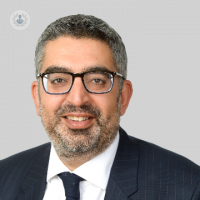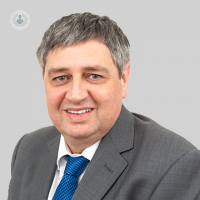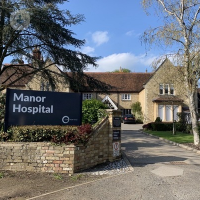What is hand surgery?
Hand surgery may be performed for various reasons, including infection to the hand, injury to the hand, or to correct long-term conditions affecting the hand.
Surgery may be done on different areas of the hand, and it can be advised to correct either the bones or soft tissues in the hand. Hand surgery is usually performed by either a general surgeon, an orthopaedic surgeon, or a plastic surgeon.

Why is hand surgery performed?
Hand surgery is often performed to correct the following conditions:
- Carpal tunnel syndrome
- Trigger finger
- Hand injuries and trauma
- Tendon repair
- Joint replacement
- Congenital defects
- Inflammatory arthritis
- Dupuytren’s contracture
- A bone deformity or extra growth (such as metacarpal bossing)
What does hand surgery involve?
Surgery on the hand varies depending on the type of condition it is attempting to correct. Many surgeries are performed as minor day case operations, meaning the patient can leave the hospital on the same day the operation is performed. Some operations are performed under local anaesthetic, meaning the patient is awake. Day-case operations are usually preferred as they allow for quicker healing time.
What is the aftercare for hand surgery?
Hand surgery may also be accompanied with physiotherapy or visits to a specialist who will show the patient how to strengthen their hand and monitor movement and function. Depending on the type of hand surgery, a splint may also be advised to help along the healing process. Healthcare providers will schedule follow-up appointments to check progress. In some cases stitches may need removing. It can take around a month or longer to fully heal from hand surgery and be back to normal.
How should I prepare for hand surgery?
Before any type of surgery, discuss the procedure and its potential risks with your surgeon. Any type of surgery, even minimally invasive, carries risks, and it is important to be aware of what could happen. Ask your doctor, surgeon or healthcare provider to explain anything that you do not understand before your hand surgery. Your general health will also be checked to make sure you will not have any problems going under a general anaesthetic, should this be used during the procedure.
Before going for hand surgery, plan your visit to the hospital, as you will have to do things one-handed afterwards. Think about the clothing you will wear, the route you will take, and if you need a friend to come help you with transport. Talk to your surgeon to be clear on the procedure and understand what is expected of you on the day.
Which specialist undertakes hand surgery?
The specialists that undertake hand surgery are orthopaedic surgeons. This also includes specialist hand and shoulder surgeons, as well as upper limb surgeons.
12-02-2013 06-08-2023Hand surgery
Mr Shahrier Sarker - Orthopaedic surgery
Created on: 12-02-2013
Updated on: 06-08-2023
Edited by: Karolyn Judge
What is hand surgery?
Hand surgery may be performed for various reasons, including infection to the hand, injury to the hand, or to correct long-term conditions affecting the hand.
Surgery may be done on different areas of the hand, and it can be advised to correct either the bones or soft tissues in the hand. Hand surgery is usually performed by either a general surgeon, an orthopaedic surgeon, or a plastic surgeon.

Why is hand surgery performed?
Hand surgery is often performed to correct the following conditions:
- Carpal tunnel syndrome
- Trigger finger
- Hand injuries and trauma
- Tendon repair
- Joint replacement
- Congenital defects
- Inflammatory arthritis
- Dupuytren’s contracture
- A bone deformity or extra growth (such as metacarpal bossing)
What does hand surgery involve?
Surgery on the hand varies depending on the type of condition it is attempting to correct. Many surgeries are performed as minor day case operations, meaning the patient can leave the hospital on the same day the operation is performed. Some operations are performed under local anaesthetic, meaning the patient is awake. Day-case operations are usually preferred as they allow for quicker healing time.
What is the aftercare for hand surgery?
Hand surgery may also be accompanied with physiotherapy or visits to a specialist who will show the patient how to strengthen their hand and monitor movement and function. Depending on the type of hand surgery, a splint may also be advised to help along the healing process. Healthcare providers will schedule follow-up appointments to check progress. In some cases stitches may need removing. It can take around a month or longer to fully heal from hand surgery and be back to normal.
How should I prepare for hand surgery?
Before any type of surgery, discuss the procedure and its potential risks with your surgeon. Any type of surgery, even minimally invasive, carries risks, and it is important to be aware of what could happen. Ask your doctor, surgeon or healthcare provider to explain anything that you do not understand before your hand surgery. Your general health will also be checked to make sure you will not have any problems going under a general anaesthetic, should this be used during the procedure.
Before going for hand surgery, plan your visit to the hospital, as you will have to do things one-handed afterwards. Think about the clothing you will wear, the route you will take, and if you need a friend to come help you with transport. Talk to your surgeon to be clear on the procedure and understand what is expected of you on the day.
Which specialist undertakes hand surgery?
The specialists that undertake hand surgery are orthopaedic surgeons. This also includes specialist hand and shoulder surgeons, as well as upper limb surgeons.


Hand surgery: The last resort in a series of treatments
By Mr Andreas Baumann
2025-01-27
The general term for various surgical procedures which aim to reduce pain and restore function in the hand, wrist or forearm is hand surgery. Highly-regarded consultant hand and shoulder surgeon Mr Andreas Baumann offers an expert insight into the area. He explains exactly what hand surgery involves, the potential complications and what recovery is like following surgery, among other important points. See more


Kienbock’s disease: caring for your hand and wrist
By Mr James Nicholl
2025-01-27
Kienbock’s disease occurs when the lunate bone in your hand doesn’t receive enough blood. After reading this article by Mr Nicholl, an orthopaedic surgeon and specialist in hand and wrist surgery, you’ll understand the factors that contribute to the development of Kienbock’s disease, its symptoms and its treatment. See more


Scapholunate ligament injuries and how to treat them
By Ms Anna Moon
2025-01-27
When a person falls over they can damage the scapholunate ligament which restricts the use of the wrist. Find out more about how these injuries can be treated. See more


The WALANT technique: the advantages of wide awake hand surgery
By Mr Philip Mathew
2025-01-27
The WALANT technique allows your surgeon to operate on your hand while you are fully awake. This safe method of hand surgery provides several advantages over more traditional means that require anaesthesia. Mr Philip Mathew, a hand and wrist orthopaedic surgeon, explains what it involves, its benefits, who can have it and its success rate. See more
Experts in Hand surgery
-
Mr Kunal Hinduja
Orthopaedic surgeryExpert in:
- Hand surgery
- Dupuytren’s contracture
- Hand injury
- Carpal tunnel surgery
- Trigger finger
- Ganglion cyst
-
Mr Andrew Fitzgerald
Orthopaedic surgeryExpert in:
- Spinal surgery
- Hand surgery
- Wrist surgery
- Elbow
- Carpal tunnel surgery
- Hand arthritis
-
Mr Ian Grant
Plastic surgeryExpert in:
- Breast reduction
- Breast augmentation
- Brachioplasty (arm lift)
- Tummy tuck (abdominoplasty)
- Hand surgery
- Skin cancer
-
Mr G Shyamalan (Shyam)
Orthopaedic surgeryExpert in:
- Carpal tunnel surgery
- Dupuytren’s contracture
- Trigger finger
- Hand surgery
- Ganglion cyst
- Epicondylitis (tennis elbow)
-
Mr Pundrique Sharma
Plastic surgeryExpert in:
- Breast augmentation
- Breast surgery
- Otoplasty
- Hand surgery
- Liposuction
- Tummy tuck (abdominoplasty)
- See all

Sussex Premier Health Hastings
Sussex Premier Health Hastings
The Ridge, St Leonards, Hastings, Saint Leonards-on-sea TN37 7RE
No existe teléfono en el centro.
By using the telephone number provided by TOP DOCTORS, you automatically agree to let us use your phone number for statistical and commercial purposes. For further information, read our Privacy Policy
Top Doctors

The Wilmslow Hospital - part of HCA Healthcare
The Wilmslow Hospital - part of HCA Healthcare
52-54 Alderley Road, Wilmslow, Cheshire, SK9 1NY
No existe teléfono en el centro.
By using the telephone number provided by TOP DOCTORS, you automatically agree to let us use your phone number for statistical and commercial purposes. For further information, read our Privacy Policy
Top Doctors

The Manor Hospital - part of Circle Health Group
The Manor Hospital - part of Circle Health Group
Church End, Biddenham, Bedford MK40 4AW
No existe teléfono en el centro.
By using the telephone number provided by TOP DOCTORS, you automatically agree to let us use your phone number for statistical and commercial purposes. For further information, read our Privacy Policy
Top Doctors
-
Sussex Premier Health Hastings
The Ridge, St Leonards, Hastings, Saint Leonards-on-sea TN37 7RE, HastingsExpert in:
- Cataracts
- General Surgery
- Orthopaedic surgery
- Diagnostics
- Ophthalmology
- Urology
-
The Wilmslow Hospital - part of HCA Healthcare
52-54 Alderley Road, Wilmslow, Cheshire, SK9 1NY, WilmslowExpert in:
- Breast Cancer
- Men's health check
- Orthopaedic surgery
- Obstetrics and Gynaecology
- Women’s health
- Sports Medicine
-
The Manor Hospital - part of Circle Health Group
Church End, Biddenham, Bedford MK40 4AW, BedfordExpert in:
- General Surgery
- Orthopaedic surgery
- Physiotherapy
- Obstetrics and Gynaecology
- General practice
- Urology
- Most viewed diseases, medical tests, and treatments
- Osteoporosis
- Ulnar nerve entrapment
- Peripheral nerve block
- Peripheral neuropathy
- Facial feminisation surgery
- Migraine
- Joint pain
- Lumbar herniated disc
- Spinal surgery
- Minimal access surgery (keyhole surgery)








